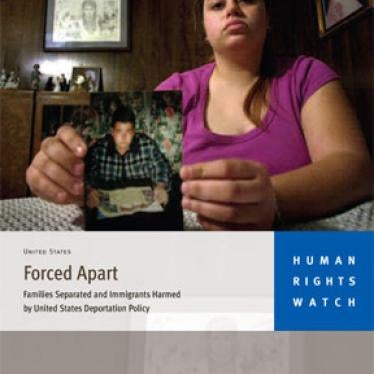Although the debate over U.S. immigration policy is often cast as a conflict between U.S. citizens and undocumented immigrants, the reality is much more complicated. Undocumented immigrants often have U.S. citizen spouses, children, and parents. It’s impossible to know exactly how many families are “mixed-status,” but an estimated 4 million U.S. citizens are the children of at least one undocumented immigrant parent. When immigrants in these families are deported, U.S. citizens also suffer grievously.
Current immigration law often disregards the human right to family unity, as Human Rights Watch has documented in “Forced Apart” and “Why Immigrant Stories Matter.” But a few provisions in U.S. law allow the government to acknowledge the importance of family ties and to use its discretion to prevent unfair results in extraordinary cases. This power to provide discretionary relief not only helps undocumented immigrants, but provides unquestionable help to their U.S. citizen families as well.
Last week, Rep. Lamar Smith (R-Texas) introduced legislation that would eliminate these discretionary powers and harm the U.S. citizens and legal residents that he claims to be protecting. Chairman Smith is planning a hearing on this act before the end of this month. The Hinder the Administration’s Legalization Temptation Act, or HALT Act, would eliminate the discretionary power of the Obama administration -- and only this administration -- to grant relief to immigrants in compelling cases, such as by suspending deportation or granting temporary legal status. Smith, who had requested that a previous administration use discretionary powers, now attempts to demonize such powers through his bill.
The HALT Act would bar relief known as “cancellation of removal,” which cancels deportation and grants legal status if an undocumented immigrant has a U.S. citizen or permanent resident spouse, parent, or child who would be seriously harmed if the immigrant were deported. The hardship caused must be “exceptional and unusual.” The immigrant must also have lived in the U.S. for 10 years and be of good moral character. In real life terms, it may protect a U.S. citizen child with a serious illness from being deported to a country where she will not get adequate medical care, or prevent an elderly U.S. citizen parent from being left destitute due to the deportation of the family’s primary breadwinner.
HALT would also end the administration’s authority to allow a select few U.S. citizens to avoid 10 years of separation from their immigrant family members. For example, U.S. citizens who are married to undocumented immigrants who entered the U.S. without a visa cannot sponsor their spouses for a visa within the U.S., but must send their spouses back to their home countries. Those who spent more than a year in the U.S. without status must then wait 10 years to be allowed back in the U.S. A waiver of the 10-year bar can be granted, however, if the U.S. citizen demonstrates that the separation would cause the citizen extreme hardship.
Recently, military personnel have found help getting legal status for their undocumented spouses through a provision called “parole.” HALT would suspend this “parole” power of the government to permit a temporary stay “for urgent humanitarian reasons or significant public benefit.” The act would also bar “deferred action,” which temporarily suspends deportation. Such suspensions have been granted recently to a parent of U.S. citizen children who has lived in the U.S. for 20 years, and to a gay man in a same-sex marriage with a U.S. citizen.
Rep. Smith accuses the Obama administration of “legalization temptation.” But if anyone is succumbing to political temptation, it is Smith, whose bill seeks to deny to this administration the authority to help families across the country. Instead of wasting time over mean-spirited legislation that will harm U.S. citizens, Smith and the rest of Congress should get back to work on enacting comprehensive immigration reform. Millions of U.S. citizens, and their undocumented family members, are desperately waiting.
Grace Meng is a researcher for the U.S. Program at Human Rights Watch.






